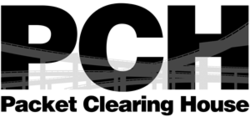Packet Clearing House
Packet Clearing House or PCH is the international organization responsible for providing operational support and security to critical Internet infrastructure, including Internet exchange points and the core of the domain name system.
 | |
| Founded | 1994 |
|---|---|
| Founder | Chris Alan and Mark Kent |
| Type | Nonprofit corporation |
| Legal status | Active |
| Focus | Providing operational support and security to critical Internet infrastructure, including Internet exchange points and the core of the domain name system |
| Location |
|
Key people | Bill Woodcock (Executive Director) Steve Feldman (Chairman of the Board of Directors) Dorian Kim (Non-Executive Director) Bob Arasmith (Systems Director) Kabindra Shrestha (Network Director) |
Revenue | USD 251,258,067 (2018) USD 255,790,216 (2017) USD 209,851,236 (2016)[1] USD 292,796,682 (2015)[2] USD 244,829,657 (2014)[3] |
Employees | 28 |
Volunteers | 50 |
| Website | pch.net |
Overview
Packet Clearing House was formed in 1994 by Chris Alan and Mark Kent to provide efficient regional and local network interconnection alternatives for the west coast of the United States. It has since grown to become a leading proponent of neutral independent network interconnection and provider of route-servers at major exchange points worldwide. PCH provides equipment, training, data, and operational support to organizations and individual researchers seeking to improve the quality, robustness, and accessibility of the Internet.
As of 2018, major PCH projects include the construction and support of nearly half of the world's approximately 500 Internet exchange points (IXPs); operation of the INOC-DBA global Internet infrastructure protection hotline communications system; support for globally anycast Domain Name System (DNS) resources including root nameservers and more than four hundred top-level domains (TLDs); operation of the only FIPS 140-2 Level 4 global TLD DNSSEC key management and signing infrastructure, with facilities in Singapore, Zurich, and San Jose; implementation of network research data collection initiatives in more than three dozen countries; and the development and presentation of educational materials to foster a better understanding of Internet architectural principles and their policy implications among policy makers, technologists, and the general public. Among PCH's more than 500 institutional donors are the Soros Open Society Institute, which funded PCH in the development of open-source software tools which assist Internet service providers (ISPs) in optimizing the routing of their traffic, reducing the cost and increasing the performance of Internet service as delivered to the public; the United Nations Development Programme, Cisco Systems, NTT/Verio, Level 3, Equinix, the governments of Sweden, Denmark, Canada, Mexico, France, Singapore, Chile, Switzerland, and the United States, and hundreds of Internet service providers and individuals.
PCH works closely with the United States Telecommunications Training Institute (USTTI) to offer courses on telecommunications regulation, Internet infrastructure construction and management, domain name system management, and Internet security coordination, three times yearly in Washington D.C., in addition to the eighty to one hundred workshops PCH teaches on-location throughout the world each year.
Locations
PCH maintains staffed offices in San Francisco, Berkeley, Dublin, Kathmandu, Buenos Aires, Johannesburg, Khartoum and Port of Spain[4] and operates critical network infrastructure within 171 Internet exchange points.[5]
Board of directors
PCH's board of directors consists of Steve Feldman (chair), Dorian Kim, and Bill Woodcock (executive director).[6]
References
- "Federal Audit Clearinghouse, 2016 Report of Independent Auditor and Financial Statements with OMB Circular A-133 Audit Reports and Supplementary Information".
- "Federal Audit Clearinghouse, 2015 Report of Independent Auditor and Financial Statements with OMB Circular A-133 Audit Reports and Supplementary Information".
- "Federal Audit Clearinghouse, 2014 Report of Independent Auditor and Financial Statements with OMB Circular A-133 Audit Reports and Supplementary Information".
- "Packet Clearing House Locations". Retrieved 2013-12-30.
- "Packet Clearing House Peering". Retrieved 2018-03-17.
- "Packet Clearing House People". Retrieved 2013-12-30.
See also
External links
- PCH.net - official website, including: Looking glass servers - White papers - Tutorials - Datasets
- Establishment of Nepal Internet Exchange: Interim Report
- Bill Woodcock: On an Internet Odyssey